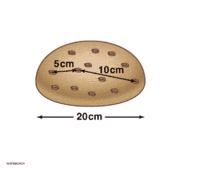
Photo from wikipedia
We derive an observational constraint on a spherical inhomogeneity of the void centered at our position from the angular power spectrum of the cosmic microwave background(CMB) and local measurements of… Click to show full abstract
We derive an observational constraint on a spherical inhomogeneity of the void centered at our position from the angular power spectrum of the cosmic microwave background(CMB) and local measurements of the Hubble parameter. The late time behaviour of the void is assumed to be well described by the so-called $\Lambda$-Lema\^itre-Tolman-Bondi~($\Lambda$LTB) solution. Then, we restrict the models to the asymptotically homogeneous models each of which is approximated by a flat Friedmann-Lema\^itre-Robertson-Walker model. The late time $\Lambda$LTB models are parametrized by four parameters including the value of the cosmological constant and the local Hubble parameter. The other two parameters are used to parametrize the observed distance-redshift relation. Then, the $\Lambda$LTB models are constructed so that they are compatible with the given distance-redshift relation. Including conventional parameters for the CMB analysis, we characterize our models by seven parameters in total. The local Hubble measurements are reflected in the prior distribution of the local Hubble parameter. As a result of a Markov-Chains-Monte-Carlo analysis for the CMB temperature and polarization anisotropies, we found that the inhomogeneous universe models with vanishing cosmological constant are ruled out as is expected. However, a significant under-density around us is still compatible with the angular power spectrum of CMB and the local Hubble parameter.
Journal Title: Journal of Cosmology and Astroparticle Physics
Year Published: 2017
Link to full text (if available)
Share on Social Media: Sign Up to like & get
recommendations!